I was a little bit worried about the cycling, but the guides and the TT leader were really helpful and supportive, and it turned out to be the highlight of the trip! It was amazing.
Jane RLocation
Difficulty
Accommodation and Meals
Lodge, Campsite, Hotel, Village Homestay
Duration
8 Nights
Meeting Point
Kota Kinabalu
Annual Leave
5 days off work
Group Size
Up to 20
Seasons
March, April, June to September.
Walking Distance
60km
Meet Gaynor, a director of, and one of the co-founders of Tribal Tracks.
Summit Borneo’s highest peak, Mount Kinabalu, standing at 4095m, while watching the sun rise over Sabah, and setting your sights on your goal – the South China Sea.
Then bike and jungle trek your way from the summit down to the beautiful sea, discovering villages where tourism is little known.
End this fabulous journey on the sea by taking to the water on kayaks.
All the info you need
Trip Details
We created this unique challenge following a request from one of our clients, and it remains a firm favourite. It combines pretty much everything: summiting a mountain, biking, trekking through jungle, getting off the beaten path and finding little known villages.
We first summit Mount Kinabalu, before trekking and biking our way down to the South China Sea. It is a fantastic opportunity to get under the skin of Borneo, experiencing all the different elements the state of Sabah has to offer.
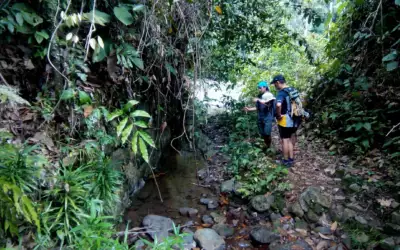
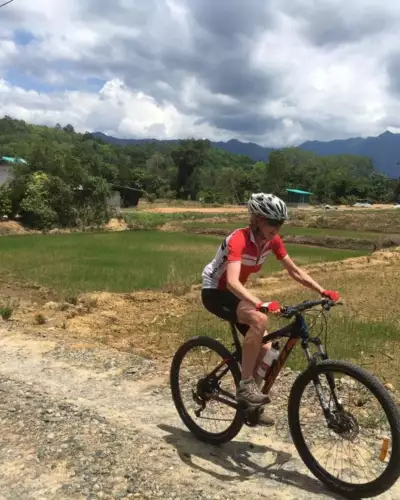
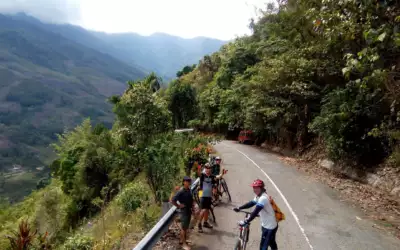
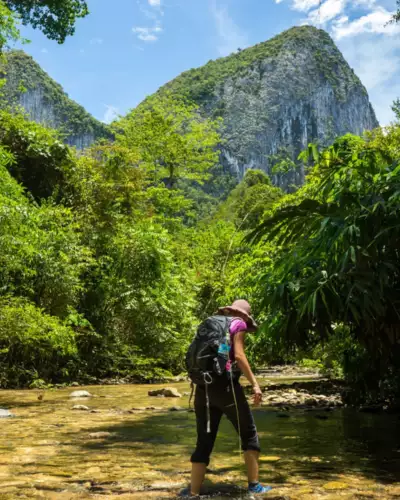
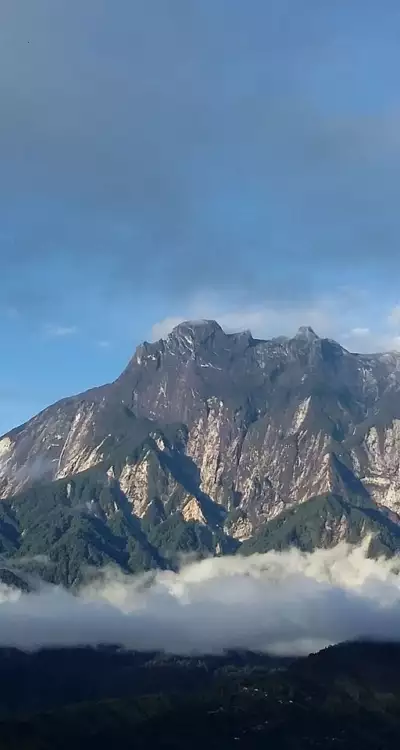
Trip Details
The excitement begins at the UK airport when we meet the Tribal Tracks UK leader who will be with us throughout the trip.
Leaving the UK, we fly to Borneo (BKI - Kota Kinabalu). We will be met by our Borneo team before heading to our hotel in central Kota Kinabalu. The rest of the day is free and easy - we can relax by the rooftop pool or explore some of the interesting sights in central Kota Kinabalu and the local markets. Tonight have dinner in a nearby restaurant and afterwards, have a briefing on the next few days.
Accommodation and Meals
Twin-share at a hotel in KK, dinner.
It will be an early start, leaving the hotel at 6:30am and heading to Kinabalu National Park. The journey will take approximately 2 hours as we drive north from Kota Kinabalu and travel over the Crocker Range mountains.
There will be a brief refreshment stop at Nabalu Market on the way. Upon arrival at Kinabalu Park Headquarters we will pre-check in at Kinabalu Park's office to register for our climb. During the rest of the day, we will take an acclimatisation trek along the marked trails in Kinabalu Park, and we will also visit the Botanical Garden. While the trek will not be long (we want to keep legs 'fresh' ahead of our climb tomorrow), it will help us acclimatise to the higher altitude as well as offer us the opportunity to learn about the amazing variety of flora found in this stunning National Park.
Accommodation and Meals
Full board. Overnight in lodge in Kinabalu Park in mixed dormitory rooms with shared facilities.
After breakfast, we meet up with our Kinabalu mountain guide and we head to Timpohon Gate by coach for the start of our climb of Mount Kinabalu.
The trek will take 5 - 6 hrs from Timpohon Gate to the goal for today, the mountain huts at Panalaban where we will stay this evening. We pass through different vegetation zones: from oak and chestnut trees at the start, to mossy, more tropical trees in the middle, and eventually, alpine vegetation towards the top. Between 13:00 - 16:00hrs (it depends on our trekking pace) we arrive at Panalaban, 3272m, where the huts are located. It's then time to relax and enjoy the spectacular mountain landscape in the evening.
Accommodation and Meals
Full board. Overnight Laban Rata Resthouse in mixed dorms.
This morning we get acquainted with our bikes for the first time, and we embark on a 20km cycle through Kiau Valley to Kampung Kaung, enjoying amazing views of the jungle-clad valley and Mount Kinabalu.
At the end of the ride the bikes are loaded onto a transfer truck (we will meet them again tomorrow!) and from here, we start trekking through the jungle. During the trek we cross a few rivers, eventually arriving at the paddy fields of Kampung Tambatuon, where we stay overnight in the village community homestay. The homestay offers comfortable dorms and a huge veranda facing the granite walls of the western flanks of Mount Kinabalu. In the evening, we will enjoy local dishes prepared by our guides.
Accommodation and Meals
Village homestay, full board.
Today is a full day of biking as we head towards the bustling town of Kota Belud, a 38km ride.
This morning we will bike along mostly gravel roads for 25km, through the Sabah countryside, stopping along the way to swim in cool rivers (a welcome relief!) and entertaining the bemused locals. We stop for refreshment breaks along the way with cool drinks supplied by the support vehicle. Taginambur is a small rural town where we have lunch at a local cafe and enjoy the tasty local cuisine. After lunch, we ride the final 13km to Kota Belud. Kota Belud is the hometown for the Bajau tribe, commonly called ‘the sea gypsy’. The Bajau of Kota Belud are famous for their horse-riding skills and are also called the 'Cowboys of the East'. We arrive at our hotel in the late afternoon and there will be time to freshen up before we have dinner at Joe’s café, a piece of Kota Belud’s history, which was very popular among the allies during WW2.
Accommodation and Meals
Overnight hotel, full board.
Today, our goal is the South China sea and the completion of our incredible challenge! We take to the bikes again, for a fairly short ride to the coast, approximately 13km.
The route follows sealed roads heading to Usukan Cove Lodge. We enjoy the stunning views of the northern gullies of Mount Kinabalu, including the infamous Low’s Gully, hardly believing that we stood at the summit a few days ago. Once we arrive at Usukan Cove Lodge we celebrate the end of the challenge with a splash in the sea or you can simply chill out on the beach and enjoy a well-deserved rest. Lunch will be at Usukan Cove Lodge before we return to Kota Kinabalu for a final night celebration dinner at a local restaurant.
Accommodation and Meals
Overnight in Kota Kinabalu hotel, twin share room, full board.
Before we start our journey back home, we have the opportunity to enjoy a snorkelling adventure in nearby Tunku Abdul Rahman Marine Park, exploring the coral reefs of the South China Sea which has framed our trip for so many days.
It is a short walk to Jesselton Point Jetty in central Kota Kinabalu, where we travel by boat to the islands in the Marine Park. Our PADI Instructors will take us snorkelling along a coral reef teeming with marine life, to see species such as Damselfish, Puffers, Lionfish, Parrotfish, Blue Spotted Rays, Clownfish (AKA Nemo) and a turtle if we are lucky! If you are not keen on snorkelling, you can relax on the beach or just be at leisure instead.
We return to the jetty in Kota Kinabalu by late morning in time to get changed before a final lunch before we transfer to the airport for our flight back to UK. (Flight departures from 16:30 onwards).
Accommodation and Meals
Breakfast and lunch.
Trip Details

Trip Details
This is what you will need to buy/source yourself.
It is important that you read the itinerary carefully, and take account of the rating we have given it.
Although our challenges are not technical, they do require a good degree of physical fitness. The conditions will require stamina and strength, which you should recognise and train for. This will be a much better experience if you are fit and prepared. You should feel comfortable walking 6-8 hours per day.
Tribal Tracks considers the safety of all of its participants and staff to be a top priority, and as such we have thorough safety systems in place.
In the event of an injury, we have an evacuation plan in place for all elements of the trek route. We do ask that you look after yourself during the trek in the following way, as this will help avoid unnecessary problems:
It is a requirement of Tribal Tracks booking terms and conditions that each supporter must hold their own travel insurance which covers the trip and the activities they are doing.
We advise you to put insurance in place as soon as possible. Your insurance must be valid and in date, covering the entire period that you are travelling for, including the return journey home. It should cover medical and personal accident risks, and should include repatriation costs and air ambulance or helicopter rescue services, where appropriate. We are happy to help you if you have any queries about this or have any difficulties.
Tribal Tracks has 100% Financial Protection and has a trust account with the Protected Trust Service, member number 5566.
This means that all client monies paid to Tribal Tracks are held in our dedicated trust account, which is supervised by an independent trustee. This means that in the very unlikely event that Tribal Tracks ceases to trade, your money is safe. For more information, please visit this link. Any flights booked for you by Tribal Tracks will be ATOL protected under our own ATOL certificate.
We know that the unexpected can happen.
While you are away, things can happen at home and people may need to get in contact with you. This can be tricky when you are in remote areas. So, shortly before departure, we provide you with an Emergency Procedure document to distribute to your nearest and dearest. This sets out how to contact Tribal Tracks and the steps Tribal Tracks will then take to get in contact with you.
In setting the maximum size of our groups, we take a number of factors into account.
Altitude, degree of difficulty, the terrain, the climate and time of year, all determine the maximum group size. Sometimes it will be 20, sometimes it will be 8-14, but safety is always our priority.
The minimum number to participate is 2. You will be accompanied by a Tribal Tracks UK Leader, Mountain Leader qualified, as well as supported by our local, in-country guides.
It is really important that you are well prepared for your physical challenge and that you are confident that you will be able to fully participate.
Although our leaders are well trained to deal with different capabilities, if they have any concerns about someone’s ability to safely partake in the trek, or their impact on other people’s enjoyment, we authorise them to take necessary action which, in some circumstances, may involve asking someone to step out of the trek. Although this is a very rare occurrence, by booking this trip you agree to section 11 of our Booking Conditions which clearly states that our leaders have the authority to do this. In these circumstances, we will ensure anyone sitting out is safely provided for and offered alternative options where possible. Refunds will not be provided for activities missed and customers may be liable for additional costs incurred.
At Tribal Tracks, Responsible Travel is enormously important to us, and our commitment to responsible travel is evidenced in every itinerary that we prepare.
Core to our business is the belief that holidays can and should be enjoyable to the traveller but should be conducted in a socially, environmentally and economically responsible manner which brings benefit to local communities. This is implemented through a variety of measures which can be found in our Responsible Travel policy - http://www.tribaltracks.co.uk/responsible-travel-policy. We encourage you to read this and to play your own part in travelling responsibly.
Trip Details
One of the most common pre-trip questions we receive is all about what to pack, and what the essential items are. This is a list of recommended kit to take. We have tried to pare down this kit list to the absolute musthaves for your trek, but above all you should use your common sense and your own personal preferences when you are packing.
Check out our additional notes at the bottom of this list.
Trip Details
The trek is a challenge. We will be walking for a long time over sometimes challenging terrain with steep ascents and descents.
The best way to build endurance fitness is to start with some gentle walks and gradually build up both the distance and duration over the next few months. In the last 2 months, we would recommend to go out and do long days, ideally in the hills, to build up the strength in your legs. About a week before the trek, limit any training to short walks – you want to have fresh legs at the start!
For the trek you should be comfortable trekking between 6 - 8 hours per day, but remember we have all day to achieve the distances and will not be going at racing snake pace. It may sound obvious, but make sure that you are walking properly, hitting the ground with your heel first, then rolling onto your toe, which pushes you onto the next step (this will help reduce the risk of shin splints and tendon pulls). Walk with your head up, eyes forward and shoulders level.
It is a good idea to develop a level of cardiovascular fitness (exercising and strengthening your heart and lungs). This comes from running, cycling or swimming for between 20 minutes and an hour, and will really help develop your endurance fitness. Three sessions a week is normally advised, increasing time and distance over time.
Replicate conditions in training i.e., use all the kit you will be using and try your walking poles if you want to use them.
It is important to pack so that you know where everything is. Separating kit into different packing cubes, or even plastic bags can really help with this. You can pack by item (eg socks and pants in one cube, tops in another etc) or by day, putting your entire outfit for that day together in one place. Taking an extra bag or cube to separate dirty kit is a great idea.
You will have two bags on the trip - your main bag and your back pack.
You should operate on the basis that you will not have access to your main bag during the day and while you are trekking. This means that it is important to have everything you need in your back pack. Waterproofs should go in the bottom, together with an extra layer, sunscreen and sunglasses, plus hat and gloves (if you are in a colder climate). You should also have your water bottles, and any specific snacks, medicines or first aid items you want to take, such as zinc tape and blister plasters. Baby wipes/toilet roll and nappy sacks are also essential for going to the toilet while you are trekking - we will explain more in the pre-departure briefing!
In the event of an injury, we have an evacuation plan in place for all elements of the trek route. We do ask that you look after yourself during the trek in the following way, as this will help avoid unnecessary problems:
We will brief you in the pre-departure briefing as to the catering specifically for your trip. However, as a guide, each morning you will be provided with a very filling local breakfast, usually accompanied by tea or coffee. Lunch will be during your trek and will be prepared by the team of cooks or we will utilise local restaurants or teahouses. Food will always be ample and tasty. If wild camping, dinner will be in the dining tent and will be traditional, freshly prepared food. If you are staying in a hotel or teahouse, dinner will be served there. Water, tea and coffee will be served and alcohol will usually not be available, although there will be some exceptions. We will provide 4 litres of drinking water per person per day. You will need to fill up 2 litres at breakfast and another 2 litres at lunchtime.
Please ensure that you have notified us before departure if you have any specific dietary requirements or allergies as we can cater for most.
Please inform us of any dietary requirements or allergies before you travel, and preferably at the time of booking. We can cater for almost all diets, so please just let us know. We can't cater for you if we don't know what you need!
You will sleep in shared tents (unless a single supplement has been requested). Mattresses are provided, which makes it much more comfortable! There will be a central dining tent available with rugs and lights where the group can get together in the evening, share stories and enjoy meals. There will also be an open fire wherever it is possible.
Sleeping bags are designed to work by trapping your body heat in the down surrounding you. If you wear lots of layers, your body heat will not be able to escape as effectively, and you will be cold. Wearing a thin thermal layer is ideal. It does sound counter intuitive, but we promise that it works!
Putting your clothes for the next day in the bottom of your sleeping bag will also help with warmth, as it will fill up any spare space around your feet, and it will mean your clothes are nicely warmed up in the morning.
If you find it difficult to sleep without a pillow, we recommend that you take a travel pillow and a regular pillowcase with you. Put your pillow in the pillow case, and use your down jacket/layers to fill out the pillowcase, you will end up with a pretty decent pillow!
And as for stuff or roll when it comes to packing your bag away? We are very much in the stuff camp!
There will be early morning starts, typically around 0600 - 0700hrs, so that the team can set off on the trek in good time. It is important that you pack up your kit before breakfast and leave your bag outside your tent or accommodation so that the crew can load them onto the jeeps and/or mules. There will be a freshly cooked lunch provided on your trek route. The aim is to get into camp before sunset if possible, when you can enjoy a hot drink and snacks. It is important that you change into your thermals and put layers on when you get into camp as the temperatures can drop sharply and you need to keep warm.
In the morning, the Tribal Tracks leader will wake up the group. When you hear the call, please begin to get ready, and pack all your kit away in your 'main bag' before breakfast. Put this bag outside your tent or accommodation as the crew can then begin to break down the tents/load the luggage. Ensure that you have all that you need in your backpack for the day, as you will not have access to your main bag until the next camp (see 'What do I put in my backpack?).
When you arrive into camp, it is important to get changed into different clothes, usually the ones that you will be wearing the next day. Even if you have had dry weather, you will have been sweating, and your clothes will be damp. As the sun sets and the air cools, you will quickly feel cold. Before this, you will want to freshen up and we recommend the 'baby wipe bath'. As there are no showers while on the trek, having a freshen up with a baby wipe will help keep you clean and will make you feel much better, before you put your clean clothes on. Unpack your sleeping bag and get everything out that you need for nighttime, such as your warm hat, jacket, head torch and book. Sort out your back pack for the next day by removing rubbish and replenishing snacks etc.
Doing this before dinner will mean you can get into your sleeping bag quickly, when it is likely to feel cold.
There will be a toilet tent and water supplied for washing in the morning where we can. There are no shower facilities provided during the trek and there will be no toilets either, but there will be a toilet tent in camp in the evenings and mornings. In the pre-departure briefing, we will tell you all that you need to know about how to deal with this.
For up-to-date vaccinations information please visit the NHS website ‘Fit for Travel’ at: http://www.fitfortravel.nhs.uk. The Tribal Tracks team are travel professionals, but we are not medical experts, and we would encourage you to visit your GP or travel nurse to discuss vaccination requirements. Please remember to take your itinerary with you so that they can see where you will be travelling. You should make an appointment at least 3-4 months before you travel.
In addition, please note that information on vaccinations can change at short notice; we recommend that you contact your Medical Professional or a Travel Health Clinic at least 8 weeks prior to departure for the most up to date information.
We recommend that you bring a multi-region adapter plug with you. There will be no facility to recharge electrical items on the trek, so we recommend you bring a power bank to top up the charge. We also recommend putting your phone on Airplane mode during the day to save on power.
Using your mobile overseas can sometimes attract unwelcome, very high tariffs. We recommend that you check with your network provider before you travel, but if in doubt, keep your phone switched to Airplane mode and use it only when there is WiFi. Reception can also be patchy, and unreliable, particularly in remote areas, which is why we carry a satellite phone with us. Please let your nearest and dearest know about this, and warn them that you may not be able to be in regular contact.
We ask that your luggage is kept to the absolute minimum. We will tell you the weights that you should not exceed, but usually, your main bag should not exceed 23kgs in weight.
It is important that you wear, or take your trekking boots with you in your hand luggage on the flight, as they are vital for the trek and cannot be replaced in the event of lost luggage.
We recommend leaving behind items such as high value jewellery, watches etc. Your passport and money should be always kept on you.
Trip Details
You may want to relax after your trip, or take a trip to see the famed flora and fauna of Borneo. We have many suggestions to extend your trip, and we are happy to put a bespoke itinerary together for you. Just ask!
Let’s get you on the right track!